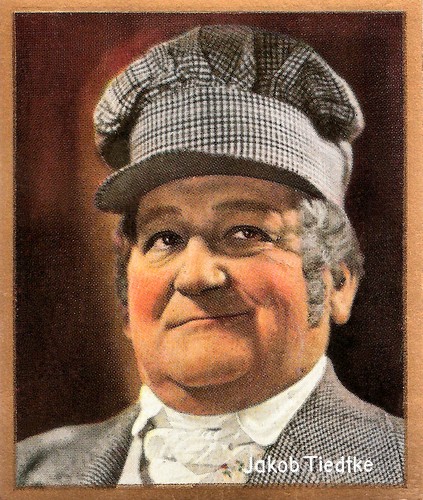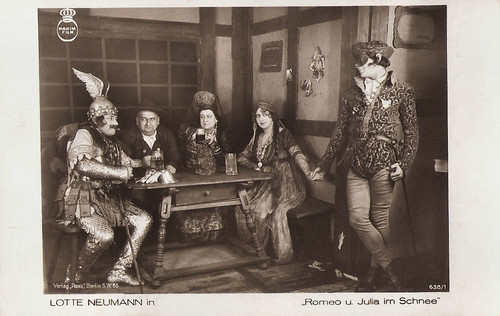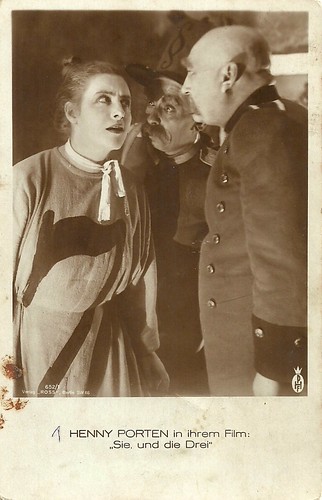
German cigarette card in the series Unsere Bunten Filmbilder by Ross Verlag for Cigarettenfabrik Josetti, Berlin, no. 179. Photo: Ufa.
The corps bird of Max Reinhardt
Jakob Karl Heinrich Wilhelm Tiedtke was born in 1875 in Rixdorf near Berlin, today the district of Berlin-Neukölln. His father was a humorous writer and contributor to the richly illustrated German weekly Fliegende Blätter, Kladderadatsch, and the like. After attending the Köllnisches Gymnasium in his native city, Tiedtke graduated from the Seebach-Schule, which was affiliated with the Berlin Königliches Schauspielhaus.
After completing his studies, the young actor made his debut there in 1899 as Cato in the Shakespeare tragedy 'Julius Caesar' and shortly afterwards went to the Preußisches Hoftheater, where he was a member of the ensemble until 1905. Then he followed a call from Max Reinhardt to the Deutsches Theater for eight years, where he distinguished himself as a hard-working character actor. At Max Reinhardt's Deutsches Theater Tiedtke became known as the "corpse bird" when he was not playing himself, he sat in the stalls so that he could step in immediately if an actor dropped out.
He had all the possible roles in his head. Thus he became Reinhardt's busiest character actor, portraying mostly old men in over 100 productions, such as the medical councillor Dr. von Brausepulver in the world premiere of Frank Wedekind's children's tragedy 'Frühlings Erwachen' (Spring Awakening, 1906). The transition to comedian came with increasing corpulence. Tiedtke recounts how he was once asked to stand in for an actor who had fallen ill and play old Moor, who is locked in the hunger tower by his own son.
In 1913 Jakob Tiedtke moved to the private Deutsche Künstlertheater Societät and a year later to the Lessingtheater under the direction of Victor Barnowsky. This was followed in 1915 by a three-year engagement at the famous Vienna Burgtheater. Until 1925 Tiedtke made guest appearances at various Berlin theatres and belonged to the ensemble of the Berlin Volksbühne from 1933 to 1945. During the National Socialist era, he was a presidential advisor to the NS leader corps Kameradschaft der deutschen Künstler.
After the end of World War II, Tiedtke founded the Künstlergemeinschaft Bad Ischl together with Theo Lingen, Paul Kemp, Siegfried Breuer and other fellow actors, which toured Austria for two years. Afterwards, the actor was able to perform successfully again in Munich and Berlin, and he also shone in Hamburg, among other places, at the Thalia Theater at the beginning of November 1949, where, on the occasion of his 50th stage anniversary, the comedy 'Der gute Onkel Jan' by Georges Feydeau with Tiedtke in the title role was performed in German for the first time. In addition to important theatre characters such as Iago in Shakespeare's 'Othello', Mephisto in Goethe's 'Faust', or Franz Moor in Schiller's 'Die Räuber', his brilliant roles on stage included above all interpretations in classical comedy plays and farces. Among others, Tiedtke shone as the village judge Adam in Kleist's 'Der zerbrochne Krug', as Theobald Maske in Sternheim's 'Die Hose', or as Falstaff in the Shakespeare comedy 'The Merry Wives of Windsor'.
As a performer of Molière's characters, he impressed the audience as 'Der eingebildete Kranke' (Le malade imaginaire), as 'Tartuffe', and as 'Der Geizige' (L'avare), and he was equally captivating as the smear theatre director Emanuel Striese in the farce 'Der Raub der Sabinerinnen' by Franz and Paul von Schönthan or as Baron Weps in the operetta 'Der Vogelhändler' by Carl Zeller. His Berlin humour and Berlin imperturbability shaped Tiedtke's character, which he also lent to his characters on stage. He was more of a quiet comedian who cared more about the heart than the punch line. Tiedtke always wanted to play as realistically as possible, never elevating himself above his characters or presenting satirical commentary. "I don't want people to see that he is an actor! That is my creed". He avoided exaggeration, strove for moderation and naturalness, and in his private life was proud of the fact that people said to him: "If I didn't know that you were Tiedtke, I would never take you for Tiedtke!" "Ick bin normal". He was proud of that.

German postcard by Ross Verlag, no. 636/1. Photo: Maxim Film. Lotte Neumann in the comedy Romeo und Julia im Schnee/Romeo and Juliet in the Snow (Ernst Lubitsch, 1920). The man on the left dressed as an antique hero could be Julius Falkenstein as Paris. The others are from left to right Jakob Tiedtke (Herr Capulethofer), Marga Köhler (his wife), Lotte Neumann (Julia) and Gustav von Wangenheim (Romeo Montekugerl).

German postcard. Ross Verlag, no. 638/2. Photo: Maxim Film. Publicity still for Romeo und Julia im Schnee/Romeo and Juliet in the Snow (Ernst Lubitsch, 1920), with Lotte Neumann (Julia Capulethofer) and Gustav von Wangenheim (Romeo Montekugerl). Behind them, Jakob Tiedtke and Marga Köhler as Julia's parents.

German postcard by Ross Verlag no. 639/8. Photo: Messter-Film. Jakob Tiedtke, Henny Porten and Emil Jannings in Kohlhiesels Töchter/Kohlhiesel's Daughters (Ernst Lubitsch, 1920).
Lubitsch's film daddy Tiedtke
Jakob Tiedtke had already come into contact with the new medium of cinematography at an early age and showed his art in various silent flicks. Since the end of World War I, the actor had firmly committed himself to the EFA-Filmgesellschaft. His first screen appearances are said to date back to 1906, when he starred in one-act plays by the director and film pioneer Oskar Messter, although there is no evidence of this today. The first film with Tiedtke, however, was made in 1913 under the title Schuldig/Guilty (Hans Oberländer, 1913) after the stage drama of the same name by Richard Voss, starring Eduard von Winterstein and produced by Messter.
Two years later Tiedtke appeared alongside Paul Wegener in the latter's classic Der Golem/The Golem (Paul Wegener, Heinrich Galeen, 1915). With Wegener in the lead, he would also act in Der Rattenfänger/The Pied Piper of Hamelin (Paul Wegener, 1918) and Der Galeerensträfling/The Galley Slave (Rochus Gliese, Paul Wegener, 1919). He preferred to work with director Ernst Lubitsch who gave him the nickname "Filmvater Tiedtke" (film daddy Tiedtke) and cast him in his silent productions Die Puppe/The Doll (Ernst Lubitsch, 1919), Kohlhiesels Töchter/Kohlhiesel's Daughters (Ernst Lubitsch, 1920), Romeo und Julia im Schnee/Romeo and Juliet in the Snow (Ernst Lubitsch, 1920), Sumurun (Ernst Lubitsch, 1920) and Die Flamme/The Flame (Ernst Lubitsch, 1922).
The imposing figure of the mime was used by the directors again and again for quirky and droll types, which Tiedtke always knew how to breathe life into. Other major productions in which Tiedtke was involved in the 1920s include the six-part adventure film Der Mann ohne Namen/Peter Voss, Thief of Millions (Georg Jacoby, 1921) with Harry Liedtke, the Henny Porten films Die Fahrt ins Blaue/A Drive into the Blue (Rudolf Biebrach, 1918), Der Kaufmann von Venedig/The Merchant of Venice (Peter Paul Felner, 1923), Das alte Gesetz/The Ancient Law (E.A. Dupont, 1923) and Kammermusik/Chamber Music (Carl Froelich, 1925), and the lost Murnau film Die Austreibung/The Expulsion (Friedrich Wilhelm Murnau, 1923).
Then followed the Lya Mara comedy Auf Befehl der Pompadour/By Order of Pompadour (Friedrich Zelnik, 1924), Ludwig Berger's Ein Walzertraum/A Waltz Dream (1925), the adventure film Pietro der Korsar/Peter the Pirate (Arthur Robison, 1925), Die Mühle von Sanssouci/The Mill of Sanssouci (Friedrich Zelnik, Siegfried Philippi, 1926) starring Otto Gebühr, Die Apachen von Paris/Paname n'est pas Paris (Nikolai Malikoff, 1927), Dr. Bessels Verwandlung/The Transformation of Dr. Bessel (Richard Oswald, 1927), Das Spreewaldmädel/When the Guard Marches (Hans Steinhoff, 1928) with Claire Rommer, the Ellen Richter film Moral (Willi Wolff, 1928), and the Käthe von Nagy comedy Mascottchen/Mascots (Felix Basch, 1929).
In Hans Kyser's prominent historical film Luther - Ein Film der deutschen Reformation/Luther (1927), Tiedtke, alongside Eugen Klöpfer in the title role of the reformer Martin Luther, was convincing as the indulgence preacher Johann Tetzel. Tiedtke became a well-known and popular actor on the screen, especially as an interpreter of comic roles and in the role of the older bon vivant.
He remained a busy actor in the 1930s and in the talkies, and knew how to play himself into the hearts of the audience with striking supporting roles and quirky characters in popular comedy plays of the time, but also in productions of other genres. For example, he was seen as landowner and bachelor Philipp Klapproth in the farce Pension Schöller (Georg Jacoby, 1930), or as Uncle Emil in the operetta adaptation Der Vetter aus Dingsda/The Cousin from Nowhere (Georg Zoch, 1934). His extensive filmography, which lists around 200 titles in the Internet Movie Database, includes successful films such as Yorck (Gustav Ucicky, 1931), Saison in Kairo/Season in Cairo (Reinhold Schünzel, 1933), Kleiner Mann - was nun?/Little Man, What Now? (Fritz Wendhausen, 1933), and the Heinz Rühmann films So ein Flegel/Such a Rascal (Robert A. Stemmle, 1934) and Nanu, Sie kennen Korff noch nicht?/So You Don't Know Korff Yet? (Fritz Holl, 1938).

German postcard by Ross Verlag, no. 642/1. Photo: Union-Film. Pola Negri and Jakob Tiedtke in Sumurun (Ernst Lubitsch, 1920).

German postcard by Ross Verlag, no. 652/1. Photo: Henny Porten-Film. Henny Porten in the German silent comedy Sie und die Drei (E.A. Dupont, 1922). The man on the right could be Jakob Tiedtke.

German postcard by Ross Verlag, no. 658/7. Photo: Rembrandt / Peter Paul Felner-Film Co. Henny Porten in Der Kaufmann von Venedig/The Merchant of Venice (Peter Paul Felner, 1923). The man on the left may be Jakob Tiedtke.
Sincerities of a tired liar
In the adventure Verwehte Spuren (1938), Jakob Tiedtke acted for the first time under the direction of Veit Harlan, with whom he realised several other films in the next years such as Das unsterbliche Herz/The Immortal Heart (Veit Harlan, 1939) and Die Reise nach Tilsit/The Journey to Tilsit (Veit Harlan, 1939). However, these also included the unspeakable hate flick Jud Süss/Süss the Jew (Veit Harlan, 1940) as well as the propaganda films Der große König (Veit Harlan, 1942) and Kolberg (Veit Harlan, 1945). In August 1944 propaganda minister Josef Goebbels had put Tiedtke on his so-called Gottbegnadeten-Liste, he was exempt from serving in the war.
The collaboration between Harlan and Tiedtke continued after World War II, Harlan entrusted him with smaller tasks in his films Unsterbliche Geliebte/Immortal Lovers (Veit Harlan, 1951), Hanna Amon (Veit Harlan, 1952) and Die blaue Stunde/The Blue Hour (Veit Harlan, 1953), which he made with his wife Kristina Söderbaum. Tiedtke's other post-war films include Königin einer Nacht/Queen of the Night (Kurt Hoffmann, 1951), Keine Angst vor großen Tieren/Not Afraid of Big Animals (Ulrich Erfurth, 1953), Der Raub der Sabinerinnen/The Abduction of the Sabine Women (Kurt Hoffmann, 1954), Emil und die Detektive/Emil and the Detectives (Robert A. Stemmle, 1954) and finally Urlaub auf Ehrenwort/Leave on Word of Honour (Wolfgang Liebeneiner, 1955).
After that, Tiedtke slowly withdrew from acting and into private life. Until the 1950s he also worked on radio, especially for the Berlin radio station RIAS (Rundfunk im amerikanischen Sektor) and the Nordwestdeutscher Rundfunk (NWDR). After the end of the war, he was seen on stage in 1947 in the Lustspielhaus des Westens in Berlin-Friedenau together with Heli Finkenzeller and her husband Will Dohm in the comedy 'Götterkinder' (Children of the Gods) by F. D. Andam and Werner P. Zibaso.
He celebrated one of his last successes at the Berlin Schillertheater with the role of the aged Theodotus in a performance of the comedy 'Caesar and Cleopatra' by George Bernard Shaw with Walter Franck and Luitgard Im in the title roles. After the performance, he was awarded the Federal Cross of Merit for his life's work, and the Association for the History of Berlin appointed him an honorary member. Tiedtke was a friend and patron of the theatre critic and publicist Siegfried Jacobsohn.
He also had a special artistic friendship with the playwright and author Gerhart Hauptmann. In 1921, Hauptmann wrote a play especially for Tiedtke: 'Peter Brauer', the tragicomedy of an incompetent painter. It was a weak play, but Tiedtke carried it on his broad back over a hundred dangers towards great success. The premiere took place on 1 November 1921 in the Berlin Lustspielhaus, directed by Heinz Saltenburg.
Tiedtke died a few days after his 85th birthday on 30 June 1960 in his cottage in Berlin-Kladow. He had suddenly lapsed into a deep unconsciousness from which he never awoke. He was laid to rest at the Berlin cemetery Heerstraße. He left behind his wife Hanna, who was later buried at her husband's side. As the newspaper Der Zeit wrote, in his house, "Upstairs, in the Salong with a view of the Havel, Mrs. Hanna held coffee chatter, his charming, much younger wife with her at once distinguished and sedate Baltic accent, who served her husband, as he said, as 'Souffleuse and Schofföse', because he memorised his roles with her and because she drove him to the theatre in Berlin". Tiedtke's written estate is at the Staatsbibliothek zu Berlin. He called his memoirs, written in 1951 but never published, 'Aufrichtigkeiten eines ermüdeten Lügners' (Sincerities of a tired liar).

German postcard by Ross Verlag, no. 51/4. Photo: Fox. Otto Gebühr as King Frederick the Great and Jakob Tiedtke in the German silent film Die Mühle von Sanssouci/The Mill of Sanssouci (Friedrich Zelnik, Siegfried Philippi, 1926).

German postcard, no. 4008. Photo: Zander & Labisch.

German postcard by Ross Verlag, no. 7724/1, 1932-33. Photo: Atelier Marion.

West-German postcard by Kunst und Bild, Berlin. Autographed postcard.
Sources: Stephanie d'Heil (Steffi-Line.de - German), Wikipedia (German), IMDb and Filmportal.
No comments:
Post a Comment